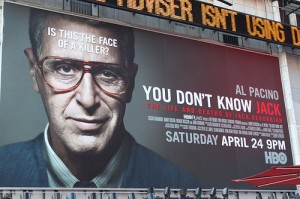Date Posted: June 16, 2011
Print Edition: June 10, 2011
By Sophie Isbister (The Cascade) – Email

While suicide itself is not illegal, it is definitely illegal for someone else to pull the trigger. As Canada’s demographics shift to see an increasingly aged population, it may be time to reopen this debate.
The recent death of Jack Kevorkian, known to the media as Dr. Death, has reignited the discussion of physician assisted suicide. Kevorkian passed away June 3 at the respectable age of 83 after a lengthy hospital stay due to pneumonia and kidney problems. When Kevorkian’s medical licence was revoked in 1991, it didn’t stop him from travelling around the USA and administering his assisted-suicide machine to terminally ill people in need.
A brazen champion of the right-to-die movement, Kevorkian even marketed his services in newspapers. He assisted at least 130 people in ending their struggle with cancer, ALS, multiple sclerosis, and other debilitating terminal illnesses, until he was charged with second degree murder and incarcerated late in his life. In the wake of Kevorkian’s death, family members of the people who he helped have spoken positively about the man.
Sue Rodriguez is possibly the most famous Canadian case of a patient seeking physician assisted suicide. Suffering from ALS, she took her case to the Supreme Court twice, and both times was denied the right to end her life with dignity in what were very tight decisions.
So what if Canadians like Sue Rodriguez (who did finally die with the help of an anonymous physician) feel like they deserve to be the ones controlling their lives? What about self-determination? What about dying comfortably, surrounded by your family instead of surrounded by hospital bills and despair? Shouldn’t that be an option?
In the landmark Rodriguez case, Justice Sopinka relied on slippery slope arguments and moralistic ideals, saying that allowing physician-assisted suicide “would erode the belief in the sanctity of human life,” also stating that “concerns about abuse and the difficulty in establishing safeguards to prevent abuse make it necessary to prohibit assisted suicide.”
Supporters of euthanasia say that current end of life care looks a lot more like prolonging death rather than life. What kind of life are people living if they can’t engage in the activities that once gave them so much pleasure, such as hugging their grandchildren or walking their dog? Patients in late stages of ALS may not even have the ability to speak to their loved ones. Supporters of euthanasia say that these people should have the control to be able to die in a painless and peaceful way.
The physician involved in assisted suicide should not be seen as an aggressor. Physicians like Jack Kevorkian, who are vocal and articulate about this worthy cause, should be seen as heroes. The brave doctors and nurses who routinely increase dosages of morphine for palliative care patients to ease their journey into death should be seen as facilitators – not as death-happy thugs looking to pull a trigger. The process of physician-assisted suicide should be legalized, regulated, and incorporated as an important, dignified aspect of palliative care. That decision should happen soon.


